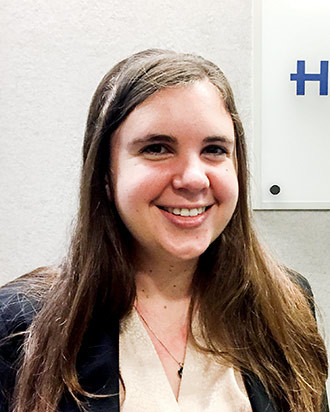You’re fresh out of law school at Boston College. What’s your goal as a young lawyer?
I think partnership still seems very far away. I was just reading in the Springfield Business Journal about the Gallop poll that said only 29 percent of millennials are engaged at work. I think the idea of partnership as a goal isn’t very engaging in the here and now. Instead, my goals are more on being able to work with our clients, increase access to justice and work within the community. I want to do the best job I can while I’m here and if that leads to partnership, that’s great. But if it doesn’t, at least I have been engaged along the way. I have been a part of something meaningful.
What does the path to partnership look like today? Has it changed?
The typical model at a big law firm is you start out as an associate and then you progress through different levels of associate work where you might have a chance to spearhead different aspects of litigation as you progress. After a certain number of years, you are evaluated. What they look at is the hours you have put in, the clients you have brought in and general contribution to the community. This is normally an eight- to 10-year journey. With millennials, there is a different perspective when you start a new job. I think in a prior generation, you were looked at or thought of yourself as loyal if you planned to stay with your job for a long time. Whereas millennials thinking in that same way, often think of being stuck. We don’t look in the long term. The concentration is more on the year to year. If it results in partnership, OK, but it’s more daunting to think that far down the road.
So the mindset has changed?
Millennials often look at our peers in the tech industry or startups and see young people being very involved from the very beginning. The millennial associate generation at law firms is eager to be involved directly working with clients. Firms like Husch Blackwell that are willing to work as collaborative teams helping clients really promotes retention. In the prior model, a new associate would be stuck in the office doing menial tasks for a few years.
Lawyers are known for working long hours. How does that fit millennials?
It doesn’t jibe with the millennial mindset if you look at it in a very narrow way. But when you broaden the perspective, millennial associates are still willing to put in those long hours if they are invested enough and bought in enough at the firm they are at.
Studies show most millennials switch jobs four times by the age of 32. Is that a reality in the law profession?
That’s a reality for firms that are clinging to old traditional theories of management, benefits and how they utilize associates. Growing firms willing to listen to what millennial associates are asking for are going to see a long-term payoff of people who stay engaged.
So employers are changing to fit the employee not vice versa?
There has to be some give and take. One of the negative characteristics we millennials can display is overconfidence, thinking that just because we went to law school we are ready to take on the world. The reality is the partners and the senior associates have so much amazing advice and experience to lead the way. There has to be compromise on both ends.
Husch Blackwell LLP associate attorney Larissa Warren can be reached at larissa.warren@huschblackwell.com.
